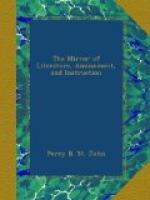Weeds are to be instantly put down on their first appearance, or corn is not to be expected; “the poor corn-plant, if left to itself, will soon be like Gulliver when bound down by the Lilliputians.” The hoe is the instrument to be used on this occasion, and then the plough; the latter operation is repeated twice; two double ploughings are the death of weeds, and the life of the plants; the first takes place when the corn is from six to eight inches high, and the second, about the middle of July, or earlier, when the plants are about a foot and a half high, or from that to two feet. “Let no one,” says Cobbett, “be afraid of their tearing about the roots of the plants, when they are at this advanced age and height;” and in encouraging them to pursue the work resolutely and fearlessly, he tells them of the way in which the Yankee farmer manages the matter, and digresses, as he loves to digress, into a picture of manners, or an old recollection.
“Ninety-nine of my readers out of a hundred, and I dare say, nine hundred and ninety-nine out of a thousand, will shudder at the thought of tearing about in this manner; thinking that breaking-off, tearing-off, cutting-off the roots of such large plants, just as they are coming into bloom, must be a sort of work of destruction. Let them read the book of Mr. Tull; or let them go and see my friends the Yankees, who generally drive the thing off to the last moment, especially if they be young enough to have a ‘frolic’ stand between them and the ploughing of the corn; or if the wife want the horses to go ten or twenty miles to have a gossip with a neighbour over a comfortable cup of tea; but they, to do them justice, do not forget the beef steaks, or the barbecued fowls, on these occasions; that is to say, a fowl caught up in the yard, scalded in a minute, cleaned the next, and splitted down the back, and clapped upon the gridiron (favourite implement of mine,) and then upon the table, along with the hot cakes, the preserved peaches, and the comfortable cup of tea. If a wife want the horses for this purpose, or for any other, and should continue too long a time in a visiting or frolicing humour, the poor corn gives signs of the consequence, by becoming yellow, and sharp-pointed at the blade. By and by, however, the Yankee comes with his plough; and it would frighten an English farmer out of his senses to see how he goes on, swearing at the horses, and tearing about the ground, and tumbling it up against the plants; but, at any rate, moving it all pretty deeply, somehow or other. I have seen them do this when the tassel was nearly at its full height, and when the silk was appearing from the ears. One rule is invariable; that is, that if the corn be not ploughed at all there will be no crop; there will be tassel, and the semblance of ears; but (upon ordinary land, at least,) there will be no crop at all.”
(To be concluded in our next.)
* * * * *




